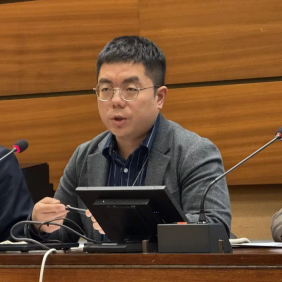China’s White Paper on Law-based Counterterrorism Efforts

China’s counterterrorism is an important part of the global efforts to combat terrorism.
A white paper on the fight against terrorism was published by China’s State Council Information Office on January 23. It is the second white paper the Office has published on fighting terrorism. The first one was published in 2019, with the title of “The Fight Against Terrorism and Extremism and Human Rights Protection in Xinjiang”.
Different from the first one, the latest white paper focuses on the Chinese government’s legislation work in the fight against terrorism. Besides the preface and conclusion, the white paper consists of five parts: “An Improving Legal Framework for Counterterrorism,” “Clear Provisions for the Determination and Punishment of Terrorist Activities,” “Standardized Exercise of Power in Fighting Terrorism,” “Protection of Human Rights in Counterterrorism Practices” and “Effective Protection of People’s Safety and National Security.”
The white paper indicates that China has developed a legal system with coherence and consistency for the country’s counterterrorism efforts, thereby effectively safeguarding the welfare, security, and human rights of its people.
China’s fight against terrorism is consistent with both international and domestic laws
Terrorism is the common enemy of humanity, and the target of joint action by the international community. For a long time, terrorism has been spreading globally, bringing numerous tragedies to human society.
To fight against terrorism while protecting human rights, the United Nations (UN) has formulated a series of international legal instruments for the suppression of terrorist attacks, such as the International Convention for the Suppression of Terrorist Bombings and the United Nations Global Counter-Terrorism Strategy.
In 2017, the UN established the Office of Counter-Terrorism to effectively prevent and combat terrorism. As a permanent member of the UN Security Council and a country that has suffered a lot from terrorism, China, holding up the principles and spirit of the UN Global Counter-Terrorism Strategy, has earnestly implemented the Plan of Action to Prevent Violent Extremism and combated international terrorist organizations, including the East Turkestan Islamic Movement (ETIM) which was designated a terrorist organization by the UN Security Council as early as in 2002.

At the same time, China has strengthened its efforts to establish a counterterrorism legal system in collaboration with neighboring countries. Within the framework of the Shanghai Cooperation Organization (SCO), China and other members have signed the Shanghai Convention on Combating Terrorism, Separatism and Extremism and other legal documents. This has formed a complete legal system that provides a solid legal basis for the SCO member countries to jointly fight against the “three evil forces” (separatism, extremism and terrorism).
China’s counterterrorism efforts also conform to its domestic laws. The Constitution of the People’s Republic of China sets out in the preamble and chapters the most fundamental and principled elements of the basic system of the state and the fundamental rights of citizens. The preamble begins with a statement of the country’s foreign policy, vowing to “promote the building of a human community with a shared future” and “strive to safeguard world peace and promote the cause of human progress”.
Article 33 of the Constitution stipulates that “the state shall respect and protect human rights”. Terrorism jeopardizes China’s national security, violates China’s Constitution and laws, and seriously undermines human rights of Chinese people. Therefore, fighting against terrorism is a legitimate power of the government granted by the Constitution, and also a must-do to protect the Constitution.
A significant portion of Chinese legislation lays the legal groundwork for counterterrorism efforts. The Criminal Law stipulates several crimes related to terrorist activities and makes special provisions for the penalties for such crimes; the Criminal Procedure Law regulates the proceedings in cases of terrorist crimes; and the National Security Law and the Counterterrorism Law were enacted in 2015.
The Counterterrorism Law protects human rights
The right to life is the fundamental value of a state and society, and the freedom from fear, considered as one of the four fundamental freedoms, has been listed in the Universal Declaration of Human Rights.
Over a considerably long period, violent terrorist activities have caused large casualties in China. According to incomplete statistics, from 1990 to the end of 2016, there were thousands of violent terrorist cases (incidents) in northwest China’s Xinjiang and other regions.
One of the most bloody and vicious terror attacks took place at Kunming Railway Station Square on March 1, 2014. Terrorists killed 31 people and wounded another 141 in that attack. Since the law-based combats against terrorism was implemented in 2016, the violent terrorist attacks had been reduced drastically. There have been no terror attacks in the country over the past five years, and people’s right to life has been fully guaranteed and is no longer threatened by terrorism.

Combating terrorism has guaranteed economic rights. A stable and safe environment is an important precondition for people to work and do business. Since the reform and opening up, China’s economy has maintained a rapid and stable growth in general, but some areas had long been affected by terrorism, disrupting local social stability and impeding economic development.
China has achieved two miracles – rapid economic growth and lasting social stability. Undoubtedly, adopting law-based approaches to counterterrorism is an important and effective pathway to safeguard the development process. The Chinese people have a stronger sense of gain, happiness, and security in recent decades along with their living standards continuing to improve. By the end of 2020, nearly 100 million rural residents had all been lifted out of poverty and China’s GDP per capita reached 89,358 yuan (about $12,555) in 2023.
Combating terrorism has also guaranteed the freedom of religious belief. Respecting and protecting the freedom of religious belief is a fundamental right enshrined in China’s Constitution. Terrorism and religious extremism have long been intertwined, stirring up unrest in different regions. They took advantage of the people’s simple ethnic and religious feelings, instigated religious fanaticism and hatred, bewitched and incited the masses, intimidated believers into engaging in violent crimes, and violated citizens’ freedom of religious belief and other human rights. Terrorism is a serious obstacle to the development of human rights. By combating terrorism and religious extremism by law, Chinese citizens’ freedom of religious belief has been secured.
As the newly released white paper said, China has found a path of law-based counterterrorism that conforms to its realities by establishing a sound legal framework, promoting strict, impartial, procedure-based law enforcement, and ensuring impartial administration of justice and effective protection of human rights.
China’s counterterrorism is an important part of the global efforts to combat terrorism. As the white paper said, China in combating terrorism always champions the common values of humanity, complies with the norms and principles of the United Nations, and conforms to the national conditions and legal institutions.
Editors: Bai Shi and Zhao Qiang
The article reflects the author’s opinions, and not necessarily the views of China Focus.
 Facebook
Facebook
 Twitter
Twitter
 Linkedin
Linkedin
 Google +
Google +




